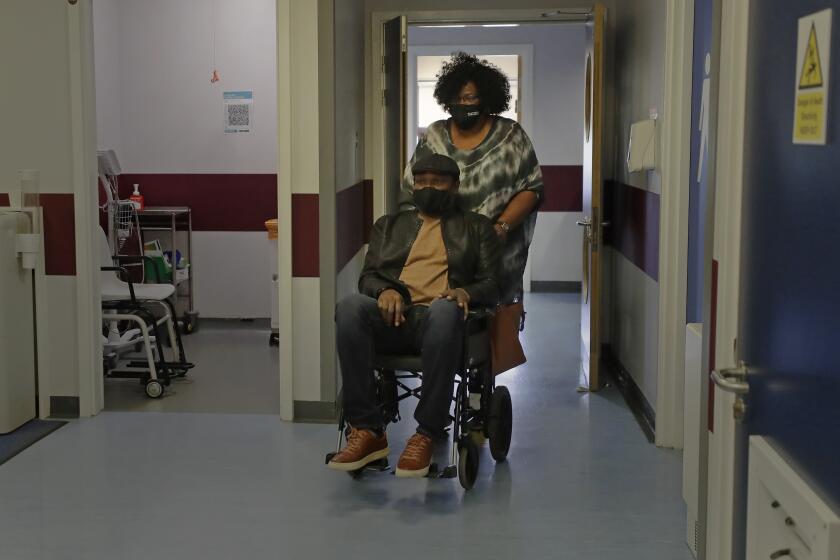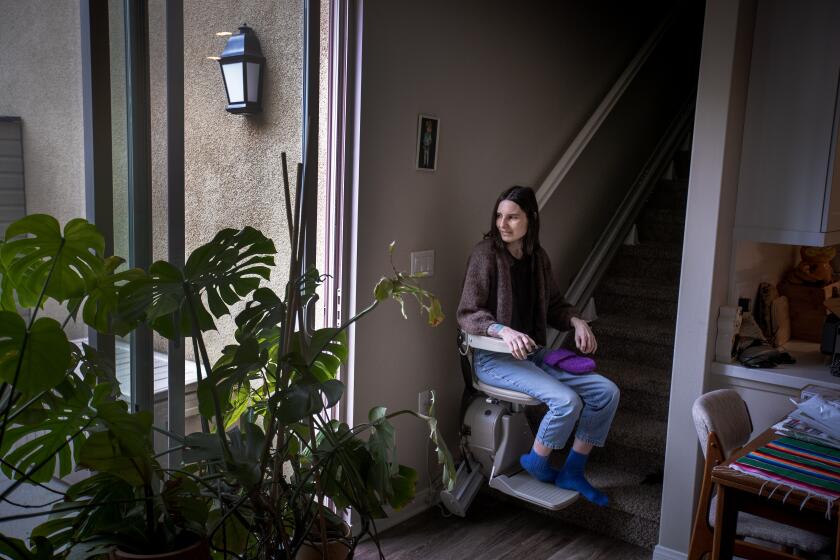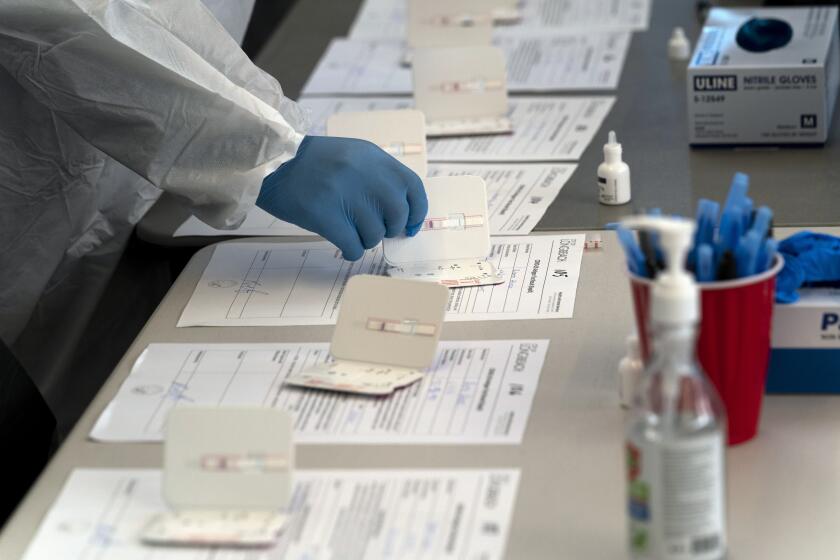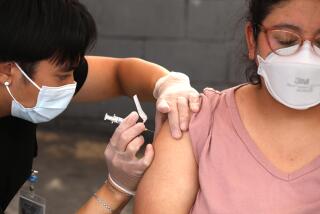Long COVID link to mental health conditions prompts federal advisory

- Share via
Federal health officials have identified a number of mental health conditions associated with long COVID, prompting them to issue an advisory to help doctors treat patients suffering from the syndrome.
Conditions could include depression, anxiety, psychosis, obsessive-compulsive disorder and post-traumatic stress disorder. Other long COVID symptoms can include fatigue, trouble sleeping and cognitive impairment, according to the advisory from the Substance Abuse and Mental Health Services Administration — a branch of the U.S. Department of Health and Human Services.
It can be challenging to determine whether mental health illness is the result of long COVID or other factors. Whatever the reason, however, “treating symptoms is vital to recovery,” the advisory said.
“This long COVID epidemic is not over. We’re absolutely in the midst of it,” said Dr. Will Pittman, associate director of the UCLA Health Long COVID Program. “Psychiatric symptoms are some of the most common symptoms that we see in long COVID.”
Rest is crucial after COVID-19, but the systems in this country don’t support mental health well or the physical health needs of folks who need it.
The advisory is partly an acknowledgment that many healthcare providers need more education on long COVID, which has been linked to numerous symptoms affecting virtually every part of the body. Even in the post-emergency phase of the pandemic, it can be hard for long-haul sufferers to get the care they need, experts say.
Although long COVID clinics do exist, their capacity is limited.
“We know that people living with long COVID need help today, and providers need help understanding what long COVID is and how to treat it,” Dr. Rachel Levine, assistant secretary for health for the U.S. Department of Health and Human Services, said in a statement.
Because long COVID can be debilitating, the advisory suggests healthcare providers approach patients as having undergone trauma. Suggested interventions include individual and group psychotherapy, peer support groups, physical therapy, neuro-rehabilitation, medication to treat anxiety and depression, speech therapy for people whose language skills were affected and treatment for people suffering from substance abuse.
The advisory also urged healthcare providers to listen, and not dismiss, their patient’s stories, manage symptoms while sharing the uncertainty of prognosis and “provide hope while helping set realistic recovery goals.” Anyone with worsening anxiety or depression, or who has thoughts of self-harm, warrants immediate action and referral to a mental health specialist.
Pittman said he’s seen patients who have long COVID but feel as though their other doctors haven’t listened to them — “they don’t feel like they’ve been taken seriously.”
Other times, some primary care physicians are linking symptoms like anxiety or depression to a long COVID diagnosis but then referring the patient to a specialty clinic instead of treating those mental health challenges.
“Primary care really needs to take the reins of treating this. And they absolutely can, and I think they do have tools at their disposal to treat this and to make patients better,” Pittman said.
The advisory notes that healthcare providers who aren’t familiar with the wide range of long COVID symptoms may misdiagnose patients. This can be another barrier to care, as patients may feel ashamed or discouraged from seeking treatment if a healthcare provider suggests symptoms are exaggerated or simply “in their head.”
Mild cases of COVID-19 can cause patients to suffer long COVID symptoms, and a new study finds that some of those symptoms can linger for more than a year.
The precise prevalence of long COVID is difficult to determine. But some scientists estimate that 10% of people who had a coronavirus infection develop long COVID. Among those hospitalized on account of COVID-19, researchers estimate 50% to 70% develop long COVID.
According to a report published in January in the journal Nature Reviews Microbiology, “Long COVID is associated with all ages and acute-phase disease severities, with the highest percentage of diagnoses between the ages of 36 and 50 years.”
Most long COVID cases, the report added, “are in non-hospitalized patients with a mild acute illness, as this population represents the majority of overall COVID-19 cases.”
Being unvaccinated increases the risk of long COVID.
There’s likely a complicated relationship between a coronavirus infection and mental health conditions, the advisory said.
Those who already suffered from depression, anxiety, stress and loneliness before a coronavirus infection are at higher risk for long COVID, the advisory said. But it’s also true that people without prior mental health conditions “are at higher risk for developing an initial onset of mental illness following COVID-19 compared to people who were not infected.”
One in 10 people infected with the coronavirus during the Omicron era suffered from long COVID, indicating the syndrome remains a notable threat.
Officials identified nine mental health conditions and other symptoms associated with long COVID in the advisory. Authorities also detailed how often symptoms or conditions were reported:
- Fatigue: Reported by 32% of COVID-19 survivors 12 or more weeks after diagnosis.
- Brain fog/cognitive impairment: Reported by 22% of COVID-19 survivors 12 or more weeks after diagnosis. Even two years after infection, there’s an increased risk of cognitive impairment for people who had COVID-19 compared with those with another respiratory illness.
- Anxiety: Symptoms reported in 35% of adults with long COVID six months after the onset of COVID-19 symptoms.
- Depression: Reported in 41% of adults with long COVID six months after onset of COVID-19 symptoms.
- Obsessive-compulsive disorder: Symptoms reported by 20% of adults one month after a hospital stay for COVID-19 infection. By comparison, about 2% of adults in the U.S. are diagnosed with OCD over their lifetime.
- Sleep disorders: Reported by 30% of adults with long COVID.
- Post-traumatic stress disorder: Diagnosis is reported in about 14% of adults with long COVID three months or more after a COVID-19 infection.
- Psychotic disorder: There’s evidence of a greater risk for a psychotic disorder six months after a COVID-19 diagnosis compared with people with another type of respiratory infection. “While risk of anxiety and mood disorders returned to baseline one to two months after a COVID-19 diagnosis, risk of psychotic disorders remained elevated two years after follow-up, suggesting a different pathogenesis for this condition,” the health advisory said.
- Initial onset of substance-use disorder: Scientists say those who were infected, but not hospitalized, with COVID-19 are more likely to be diagnosed with their first substance-use disorder six months after their diagnosis compared with people who recover from the flu.
Most L.A. County residents who had long COVID reported symptoms severe enough to limit daily activities weeks after they were infected, a survey found.
“The symptoms of long COVID are greatly varied, can go for an extended period of time and sometimes keep people from their day-to-day activities — all things that can contribute to mental health challenges,” the L.A. County Department of Public Health said in a statement.
Long-haul sufferers who are women, Black, Latino and Native American are at higher risk for also developing a mental health condition. Those who were hospitalized for their acute COVID-19 illness had a more severe initial illness or a longer duration of symptoms.
One reason why Black, Latino and Native American people are at higher risk is because those groups have higher rates of hospitalization for COVID-19 compared with white residents — a disparity officials partly attribute to increased risk of chronic disease and less access to healthcare resources among those populations.
“Inadequate access to safe housing, healthy food, transportation and healthcare can increase chronic stress among individuals in racial and ethnic minority groups, people with disabilities and people identifying as LGBTQI+. This contributes to negative impacts on their mental health and poor COVID-19 outcomes,” the advisory said.
L.A. County residents needing more information about COVID-19 can contact the Department of Public Health at (833) 540-0473. Those without a healthcare provider can call 211 to get help finding one.
More to Read
Sign up for Essential California
The most important California stories and recommendations in your inbox every morning.
You may occasionally receive promotional content from the Los Angeles Times.


















